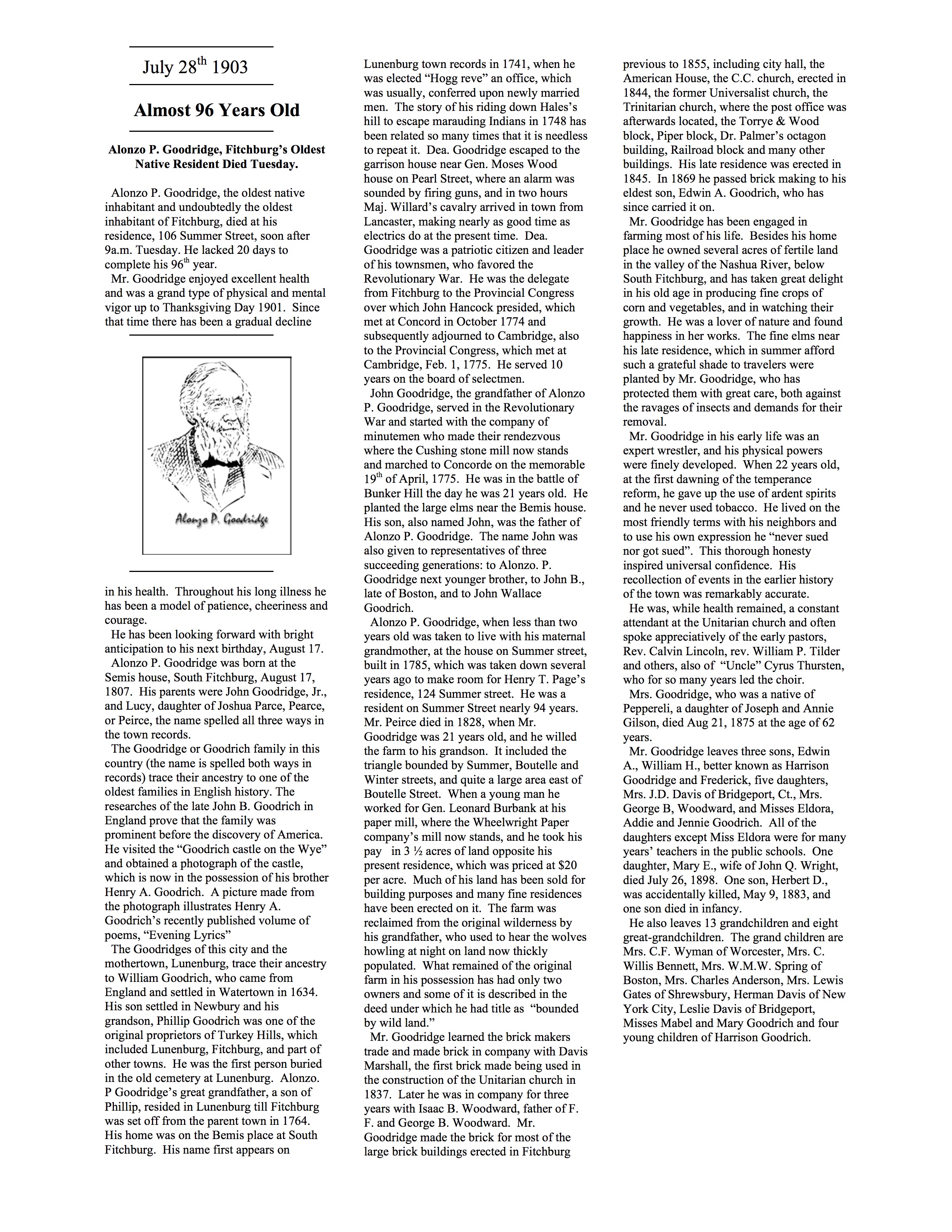Today is my Mom’s 91st birthday. Crazily enough she is still around. This retype from an article that is now over 100 years old shows the ancestry of her part of the family. Sometimes I wonder where I get my political leanings from as well as my religious viewpoints as neither of my parents pushed all that on my as a kid. I was allowed to discover all that on my own. After reading this, it feels almost burned into my hereditary DNA.
My ancestors that date back to the Battle of Bunker Hill, the First Provincial Congress and are part of the oldest families in English history.
My views that all people should be equal and no religious idea is greater than the other…well Alonzo was a member of the Unitarian Church, which practices well….look it up here: Unitarian.
So yea. When it comes to politics and religion, my views are based on hereditary knowledge and deeply held beliefs by my ancestors to try, as hard as you can daily, to just be decent…freaking people.
Happy Birthday Mom!
July 28th 1903
Almost 96 Years Old
Alonzo P. Goodridge, Fitchburg’s Oldest Native Resident Died Tuesday.
Alonzo P. Goodridge, the oldest native inhabitant and undoubtedly the oldest inhabitant of Fitchburg, died at his residence, 106 Summer Street, soon after 9a.m. Tuesday. He lacked 20 days to complete his 96th year.
Mr. Goodridge enjoyed excellent health and was a grand type of physical and mental vigor up to Thanksgiving Day 1901. Since that time there has been a gradual decline in his health. Throughout his long illness he has been a model of patience, cheeriness and courage.
He has been looking forward with bright anticipation to his next birthday, August 17.
Alonzo P. Goodridge was born at the Semis house, South Fitchburg, August 17, 1807. His parents were John Goodridge, Jr., and Lucy, daughter of Joshua Parce, Pearce, or Peirce, the name spelled all three ways in the town records.
The Goodridge or Goodrich family in this country (the name is spelled both ways in records) trace their ancestry to one of the oldest families in English history. The researches of the late John B. Goodrich in England prove that the family was prominent before the discovery of America. He visited the “Goodrich castle on the Wye” and obtained a photograph of the castle, which is now in the possession of his brother Henry A. Goodrich. A picture made from the photograph illustrates Henry A. Goodrich’s recently published volume of poems, “Evening Lyrics”
The Goodridges of this city and the mothertown, Lunenburg, trace their ancestry to William Goodrich, who came from England and settled in Watertown in 1634. His son settled in Newbury and his grandson, Phillip Goodrich was one of the original proprietors of Turkey Hills, which included Lunenburg, Fitchburg, and part of other towns. He was the first person buried in the old cemetery at Lunenburg. Alonzo. P Goodridge’s great grandfather, a son of Phillip, resided in Lunenburg till Fitchburg was set off from the parent town in 1764. His home was on the Bemis place at South Fitchburg. His name first appears on Lunenburg town records in 1741, when he was elected “Hogg reve” an office, which was usually, conferred upon newly married men. The story of his riding down Hales’s hill to escape marauding Indians in 1748 has been related so many times that it is needless to repeat it. Deacon Goodridge escaped to the garrison house near Gen. Moses Wood house on Pearl Street, where an alarm was sounded by firing guns, and in two hours Maj. Willard’s cavalry arrived in town from Lancaster, making nearly as good time as electrics do at the present time. Deacon Goodridge was a patriotic citizen and leader of his townsmen, who favored the Revolutionary War. He was the delegate from Fitchburg to the Provincial Congress over which John Hancock presided, which met at Concord in October 1774 and subsequently adjourned to Cambridge, also to the Provincial Congress, which met at Cambridge, Feb. 1, 1775. He served 10 years on the board of selectmen.
John Goodridge, the grandfather of Alonzo P. Goodridge, served in the Revolutionary War and started with the company of minutemen who made their rendezvous where the Cushing stone mill now stands and marched to Concorde on the memorable 19th of April, 1775. He was in the battle of Bunker Hill the day he was 21 years old. He planted the large elms near the Bemis house. His son, also named John, was the father of Alonzo P. Goodridge. The name John was also given to representatives of three succeeding generations: to Alonzo. P. Goodridge next younger brother, to John B., late of Boston, and to John Wallace Goodrich.
Alonzo P. Goodridge, when less than two years old was taken to live with his maternal grandmother, at the house on Summer street, built in 1785, which was taken down several years ago to make room for Henry T. Page’s residence, 124 Summer street. He was a resident on Summer Street nearly 94 years. Mr. Peirce died in 1828, when Mr. Goodridge was 21 years old, and he willed the farm to his grandson. It included the triangle bounded by Summer, Boutelle and Winter streets, and quite a large area east of Boutelle Street. When a young man he worked for Gen. Leonard Burbank at his paper mill, where the Wheelwright Paper company’s mill now stands, and he took his pay in 3 ½ acres of land opposite his present residence, which was priced at $20 per acre. Much of his land has been sold for building purposes and many fine residences have been erected on it. The farm was reclaimed from the original wilderness by his grandfather, who used to hear the wolves howling at night on land now thickly populated. What remained of the original farm in his possession has had only two owners and some of it is described in the deed under which he had title as “bounded by wild land.”
Mr. Goodridge learned the brick makers trade and made brick in company with Davis Marshall, the first brick made being used in the construction of the Unitarian church in 1837. Later he was in company for three years with Isaac B. Woodward, father of F. F. and George B. Woodward. Mr. Goodridge made the brick for most of the large brick buildings erected in Fitchburg previous to 1855, including city hall, the American House, the C.C. church, erected in 1844, the former Universalist church, the Trinitarian church, where the post office was afterwards located, the Torrye & Wood block, Piper block, Dr. Palmer’s octagon building, Railroad block and many other buildings. His late residence was erected in 1845. In 1869 he passed brick making to his eldest son, Edwin A. Goodrich, who has since carried it on.
Mr. Goodridge has been engaged in farming most of his life. Besides his home place he owned several acres of fertile land in the valley of the Nashua River, below South Fitchburg, and has taken great delight in his old age in producing fine crops of corn and vegetables, and in watching their growth. He was a lover of nature and found happiness in her works. The fine elms near his late residence, which in summer afford such a grateful shade to travelers were planted by Mr. Goodridge, who has protected them with great care, both against the ravages of insects and demands for their removal.
Mr. Goodridge in his early life was an expert wrestler, and his physical powers were finely developed. When 22 years old, at the first dawning of the temperance reform, he gave up the use of ardent spirits and he never used tobacco. He lived on the most friendly terms with his neighbors and to use his own expression he “never sued nor got sued”. This thorough honesty inspired universal confidence. His recollection of events in the earlier history of the town was remarkably accurate.
He was, while health remained, a constant attendant at the Unitarian church and often spoke appreciatively of the early pastors, Rev. Calvin Lincoln, rev. William P. Tilder and others, also of “Uncle” Cyrus Thursten, who for so many years led the choir.
Mrs. Goodridge, who was a native of Peppereli, a daughter of Joseph and Annie Gilson, died Aug 21, 1875 at the age of 62 years.
Mr. Goodridge leaves three sons, Edwin A., William H., better known as Harrison Goodridge and Frederick, five daughters, Mrs. J.D. Davis of Bridgeport, Ct., Mrs. George B, Woodward, and Misses Eldora, Addie and Jennie Goodrich. All of the daughters except Miss Eldora were for many years’ teachers in the public schools. One daughter, Mary E., wife of John Q. Wright, died July 26, 1898. One son, Herbert D., was accidentally killed, May 9, 1883, and one son died in infancy.
He also leaves 13 grandchildren and eight great-grandchildren. The grand children are Mrs. C.F. Wyman of Worcester, Mrs. C. Willis Bennett, Mrs. W.M.W. Spring of Boston, Mrs. Charles Anderson, Mrs. Lewis Gates of Shrewsbury, Herman Davis of New York City, Leslie Davis of Bridgeport, Misses Mabel and Mary Goodrich and four young children of Harrison Goodrich.

